() A confluence of events here at home in the United States, influenced by domestic and global factors, has raised the ever-increasing possibility that we could be heading into a second, major food crisis. It goes without saying that any existential or practical shortage of food will have dire implications for the health and well-being of citizens in this country.
Related Delicious, Long-lasting Recipes From the Amish That Will Help You Survive a Food Crisis
Source – Modern Survival Online
Out of all the things we take for granted in our modern era it is our extraordinary bounty of food that probably claims the top spot.
You literally cannot leave your home or walk into any store in America without passing food in incredible quantities, all freely available in an infinite variety and for very little money. This is the exception, not the rule, and I along with others in the field believe this may soon come to an end.
You don’t need me to tell you how bad things will get if you and others don’t have this assured access to food. Food is a survival necessity, but also a primordial need, one that will turn people against each other when it is lacking.
The implications for society are dire, and in this article we will be giving you our take on the pending food crisis as well as a step-by-step guide for insulating yourself and your loved ones against such an event.
Our Food Supply Chains are Increasingly Corroded
Most folks are at least six to seven steps away from their food. What do I mean by this? I mean they are removed from the actual process of obtaining their food themselves, either by catching and killing it or growing it.
The food that most people purchase comes from a grocery store, and before you can drive down to the grocery store to pick it up that food must first be grown or raised on a factory farm, picked, sometimes packed, transported to a processing facility or food production plant, processed, packaged, shipped to the grocery store and finally picked up by the consumer who drives to the grocery.
There are an awful, awful lot of moving parts at every, single step, and though a few of them may wear down, and few more may break, and the system keep working this dramatically increases the likelihood of a catastrophic breakdown.
The end result? No food on those grocery store shelves. This means that your personal food supply chain is composed of many links, each of them vulnerable to break down.
What kind of vulnerabilities? By way of a “for instance,” aside from any number of things that could go wrong at the farm, from disease or famine to natural disaster and government sponsored buyouts or total destruction of crops as they continually fiddle with the levers of our economy to transportation strikes, shut down at factories or a lack of workers to actually unload the trucks and stock the shelves at the grocery store.
Critical component or material shortages at any stop in the system can likewise bring the whole thing grinding to a halt.
With our economic, cultural and political problems here at home, each of these links in the chain is starting to thrum and vibrate under tremendous pressures.
Over the past year or two, virtually all of us have seen how quickly grocery stores can empty out, and then how long it takes them to restock. One truly catastrophic SHTF event, one that is actually worthy of the name, could mean that those shelves stay empty for the indefinite future.
With your own stomach growling and surrounded by the rumbling tummies of your loved ones, what will you do in such a situation to put food on the table?
Only Nine Missed Meals to Anarchy
One pithy observation I have heard bandied about, and one that I will not attribute thanks to uncertain provenance, is that society is only nine missed meals away from anarchy.
The implication being that just three days without the usual, reliable supply of food will see the bonds of civilized society crumble in the absence of older, closer bonds of blood and tribe and even those will be sorely tested.
I contest this, however. I maintain that in the emotionally overcharged age we live in, only three genuinely missed meals would have people teetering on the brink, waiting for the other shoe to drop so to speak.
We have already seen entire sectors of society go bugnuts crazy and burn multiple square city blocks to the ground for a lot less with absolutely no meaningful response from our so-called leaders.
What do you think will happen when EBT cards stop working, when blue collar families cannot get anything from grocery stores and when every fast food joint in the land is closed for lack of product?
A rumbling tummy is the ultimate monkey on your back, and people will do anything to procure food, including rob people who have it, killing them if necessary. You don’t want to be among them, and you definitely don’t want to be their victim.
The only solution, with this as with everything else we strive to prepare for, is to take appropriate action as early as possible.
Compared to sheltering from an oncoming tornado or repelling home invaders kicking your door in at 3:00 a.m., there is virtually nothing you’ll be able to do at the instant once the situation turns sour.
If you don’t already have materials, skills and preparatory actions put in place long before it gets to that point, you’re going to be in real trouble.
Luckily for you, we have a simple, adaptable plan that you can implement now, today, to start insulating yourself against an oncoming food crisis.
Your 3-Step Plan to Mitigating Food Crisis Risk
Beating the dangers of a cataclysmic food crisis consists of three simple steps. I say simple, not easy, because doing this right is anything but easy. Nonetheless, it must be done if you want to be ready for one of the historically most likely catastrophes.
You’ll insulate yourself and your family against a completely broken food supply chain by:
- Stockpiling food ahead of time so you have it on hand when you need it.
- Producing your own food either by growing it or raising it yourself and then harvesting it as appropriate.
- Protecting your food, and the investment of your time, energy and other resources by preserving that food against spoilage and also protecting it against those who would take it from you.
We will break down each of these steps and more detail below.
Stockpile: Have Food on Hand Before the Situation Gets Dire
The first step in our three-part plan to preventing starvation or other bad outcomes from a lack of food is to simply have a sizable stockpile of food on hand.
If you have a pantry, store room, or root cellar full of food, it doesn’t matter if every grocery in the county has no food to sell. You’ll be able to go on eating three meals a day more or less as you always have, although proper rationing should be instituted immediately if called upon.
As expected, this is something that should be done early, and often, well before the crisis closes in on its tipping point and the resulting consequences.
The old adage “buy it cheap and stack it deep” definitely applies. Trying to cram a surplus when supplies are already running low and a buying frenzy is underway or simmering is not a plan for success.
Every prepper likely understands the prudence of having a minimum 3-day supply of food on hand. For dealing with the aftermath of a natural or man-made disaster when help will be on the way shortly, this is probably adequate.
For dealing with a long or indefinite term food crisis, where a lack of food is the disaster, this amount of food will be consumed essentially in the blink of an eye.
You should be striving for a minimum 6 month supply of food on hand, and preferably a one-year supply comprised of long-lasting, nutritious staples. Having this food on hand and ready to cook with or eat straight away will be an immense comfort for you and your family.
Consider the assessment of various foodstuffs below and add any or all of them to your stash as appropriate to your intentions and situation:
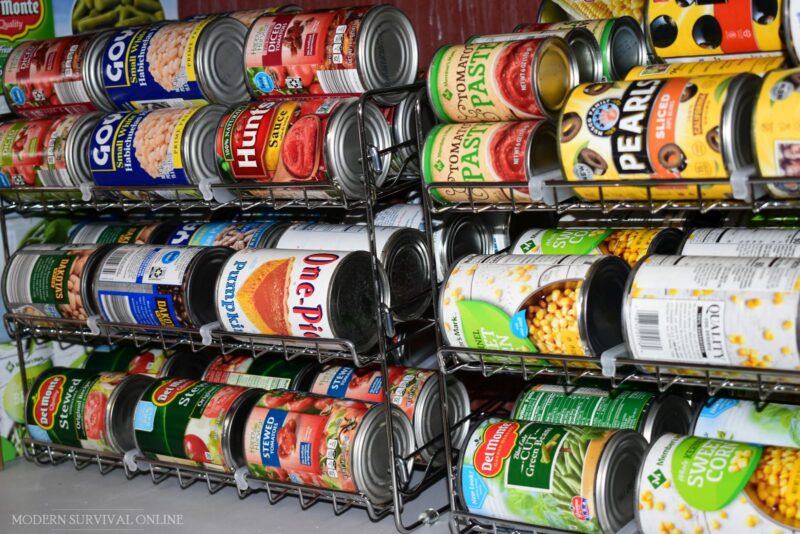
Canned Goods: Canned goods are a readily available staple that makes a good basis for your survival food stash.
You can get canned goods of all kinds pretty much everywhere, and create a substantial menu out of them alone. Vegetables, fruits and meats are all viable and will typically keep for 6 months, easily, and usually upwards of a year.
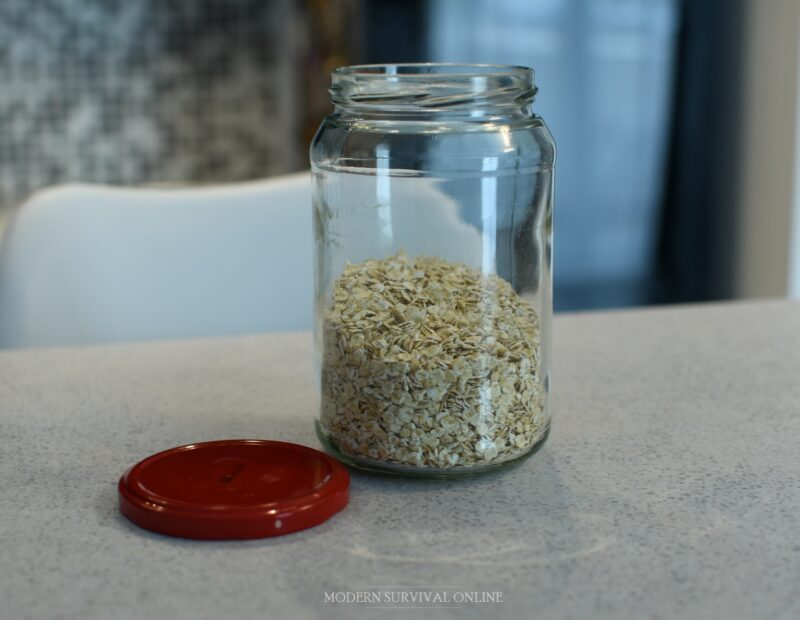
Grains: whole, dry grains are another excellent survival staple, well suited for bulk storage and quite filling while also being adaptable to creating a variety of dishes.
Perhaps the only problem with dry grains is that they typically require substantial water for preparation, though a few varieties can simply be heated, toasted or ground and Incorporated into a dish as is.
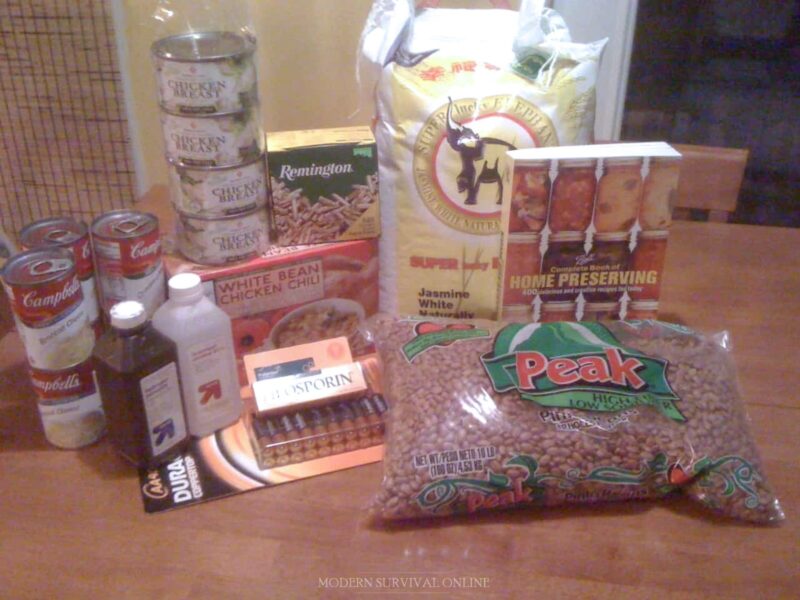
Dry Beans: Dry beans, like grains, or another calorie dense, super stable addition to your survival pantry.
For ages, beans have been a food stuff designed to go the long haul, getting villagers through cold, barren winters and explorers through their long rambles when resupply is anything but certain. Also like grains, beans typically require a considerable amount of water, boiling water at that, for preparation.
Honey: Honey is an underrated survival food, capable of lasting countless years without spoiling and packing in a considerable amount of calories and nutrition alike.
Honey kept long-term is likely to solidify, crystallizing into a solid, but it is easily reconstituted using some warm water or can be consumed as is.
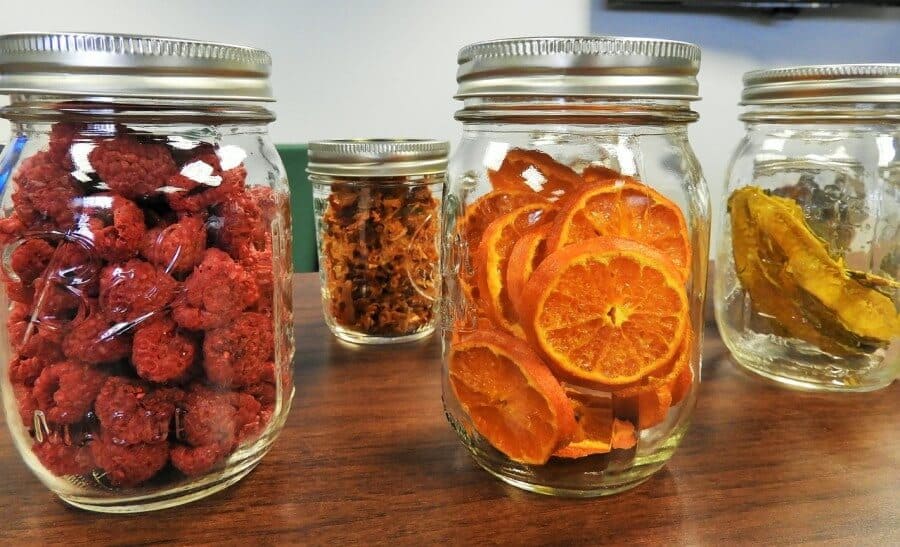
Dehydrated Meals: dehydrated survival meals and a la carte items are increasingly popular in prepping circles, and for good reason.
Boasting generally good taste, dependable nutrition and extremely long shelf lives, these are a convenient, if pricey, option for long-term food crisis survival.
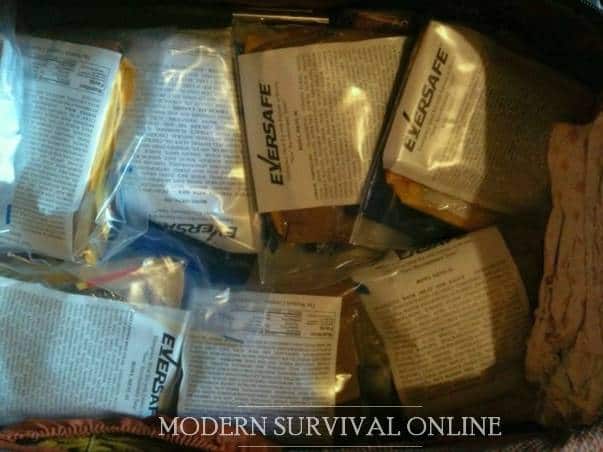
MRE’s: Love them or hate them, there is no denying the stability, durability and calorie density of military issue or civilian equivalent MREs. They are expensive, very salty and likely to give you constipation when eating long-term but these are an utterly reliable food option for long-term storage.
All of the above are valid options that can be utilized in nearly infinite ways to cover all of your nutritional and caloric bases. Some options will be better suited for those with space to spare, while others are better for folks living in close quarters.
Likewise, your access to water, backup power and other commodities might dictate which is more appealing to you. There is no truly right answer, only the answer that is right for you in your survival context.
Produce: Grow, Raise, Harvest and Preserve Your Own Food
Having food on hand is only one piece of the puzzle. Eventually, the pantry will go bare, and you’ll finally reach the very bottom of the last case and that pallet of MREs.
Considering the rest of society is going to be out of food and fighting tooth and nail to acquire what there is to be had, you had better have a backup plan. The correct answer is not throwing up your hands, shrugging, and saying “Well, I guess I’ll starve.”
No, since time immemorial people have been producing or otherwise procuring their own food. I mean actually doing the work themselves, not sighing as they have to pull on their jeans and put on their shoes the dash down to the corner store once again.
This means that you’ll be growing your own produce or raising your own livestock for slaughter or the consumption of their eggs or milk.
This might sound impossible to you, but the return on investment is usually huge as long as you know what you are doing.
A basic garden can produce an impressive crop, and a 1/8 or 1/4 acre planting can produce more than enough to seriously supplement or completely supply a small family.
Similarly, you don’t need a massive farm full of cows or pigs to keep yourselves and meet, or a giant barn full of chickens to produce eggs.
A backyard flock of chickens will keep an entire family in eggs pretty much indefinitely and can dependably supplement meat as well.
Rabbits are another good option for meat as they take up very little space and are easy to care for. Cows can obviously produce substantial amounts of meat when slaughtered and their milk can be utilized for all sorts of dairy products.
But cows are resource intensive, and also large, powerful animals. If you can stand the taste of it, you can get high quality milk from goats also and greatly reduce your space and resource investment.
But no matter which option works best for you, or both of them, growing produce and raising animals requires specialized skills, skills that you’ll need to have well ahead of time if you want to make use of them.
Getting a return out of either also takes a considerable amount of time, and you need not think you can run out and do either once things get bad and expect to get rolling in meat, eggs or milk in time to stave off starvation.
Protect: Keeping Pests and Thieves Away from Your Supply
Unfortunately, a genuine food crisis will result in a major paradigm shift and likely a collapse or major degradation in the rule of law. It is impossible for most Americans to imagine just how desperate starving people can be.
Even the most destitute, homeless malcontent likely has access to food through outreach, soup kitchens, church pantries or simple corner stop sign charity. Starvation, real starvation, will make people ruthless and crazy.
As terrible as this is to contemplate, it is easy to empathize with them. What wouldn’t you do to procure food for your quickly thinning child or your elderly mother?
Is there anything you would stop at? Would you rob? Would you kill? You probably would, and so will many others.
This means that people will come for what you have, or what they suspect you have and no matter how isolated your home is or how much care you take to hide your pantry you won’t be able to hide the fact that your beltline isn’t shrinking, your cheeks aren’t going hollow and your skin isn’t turning an ugly, pale color.
Naturally, this means that you must be able to protect what is yours if you want to be available for you and yours. Human threats call for appropriate defensive measures in the form of self-defense skill and, preferably, ranged weaponry.
But there are other threats you must defend against, whether or not you are growing food outside, storing food inside or raising animals. I’m referring to pests, rodent, insect and otherwise.
As it turns out nature is really just one big competition for space and food, and every species, insectile, reptilian or mammalian, and everything else will do whatever it can to succeed.
Tiny bugs will infest sacks of flour, grains and beans, eventually ruining them. Every kind of insect and arthropod will try to make a buffet of your garden, potentially spoiling them resulting in the loss of entire crops.
Rodents, ever the ultimate opportunists, will infiltrate any structure and gnaw through any container to gain access to food.
Your animals will have their own worries. Coyotes, foxes and wolves will easily snatch chickens and even goats. Chicken eggs are greatly prized by all of the above plus rats and snakes. All of your livestock can be made sick or unwell by a variety of tiny or microscopic parasites.
As it turns out, all of your food, no matter how hard you have worked or how much you have prepared, is not yours; it only belongs to you if you can keep it, and otherwise it belongs to whoever wants it the most.
You must be prepared with a holistic plan for protecting your food supply. Safely and securely storing preserved or pre-made foodstuffs, keeping harmful wildlife off of and away from growing crops and fending off predators from livestock at every stage of development. To do otherwise is to sacrifice the precious continuity of your food supply.
Skills and Preparations Must be Developed Ahead of Time!
If I impress upon you nothing else within the confines of this article please, please understand that growing your own fruits or vegetables, raising your own livestock and then preserving your food by any number of means is hard work requiring a considerable amount of practical knowledge.
These are skills that you must develop now, while you can, and then work continually toward refining if you want to be able to depend on them during an actual food crisis.
In bygone eras, it didn’t take much for the continuity of the individually reared or grown food supply to be severed.
Mismanaging the land when growing or rotating crops, misjudging the care, feeding or treatment of livestock. Inadequate protection against pests or predators. Being unable to cope with bad weather or other circumstantial mishaps.
One bad turn of events could mean that you are out of luck and in major trouble. How much worse will it be, then, if you do not have a comprehensive working knowledge concerning what it is you are growing or raising?
If you want to be legitimately prepared for a long-term sustainment during a regional or national food crisis you must take action now.
Stocking up must be your first step, but as soon as you have established a reasonable amount of food it is time to switch gears towards skilling up for producing your own. Nothing else will do.
Conclusion
A monumental food crisis is encroaching ever closer to the United States, and elsewhere around the world. Out of all the major catastrophes that could befall us, this is one that most preppers are probably the least equipped to deal with long-term.
Most folks are so separated from the production of their food they will be entirely helpless when the gears of commerce that bring it to grocery store shelves break down.
The only reliable protection against such an event is the ability to produce and procure your own food over a long period of time.
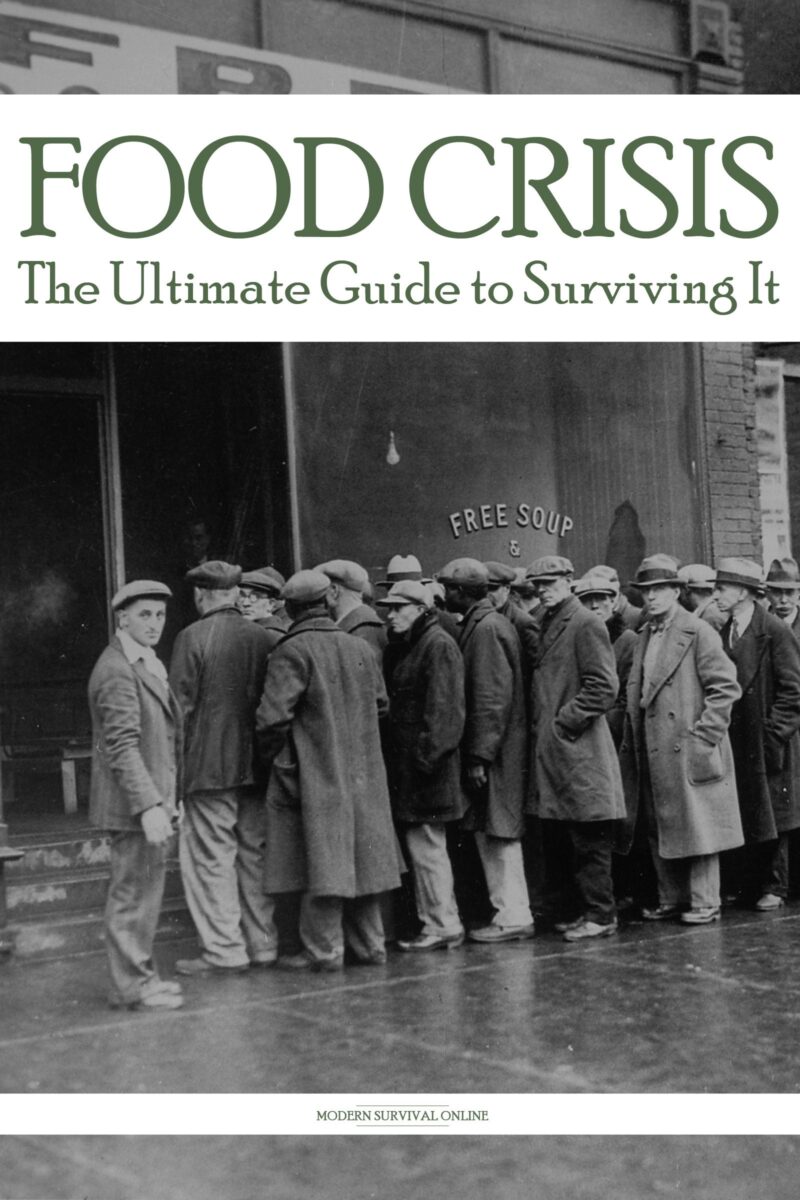
Stillness in the Storm Editor: Why did we post this?
The news is important to all people because it is where we come to know new things about the world, which leads to the development of more life goals that lead to life wisdom. The news also serves as a social connection tool, as we tend to relate to those who know about and believe the things we do. With the power of an open truth-seeking mind in hand, the individual can grow wise and the collective can prosper.
– Justin
Not sure how to make sense of this? Want to learn how to discern like a pro? Read this essential guide to discernment, analysis of claims, and understanding the truth in a world of deception: 4 Key Steps of Discernment – Advanced Truth-Seeking Tools.
Stillness in the Storm Editor’s note: Did you find a spelling error or grammatical mistake? Send an email to [email protected], with the error and suggested correction, along with the headline and url. Do you think this article needs an update? Or do you just have some feedback? Send us an email at [email protected]. Thank you for reading.
Source:
https://modernsurvivalonline.com/food-crisis-survival/
Support our work! (Avoid Big Tech PayPal and Patreon)DIRECT DONATION


Leave a Reply